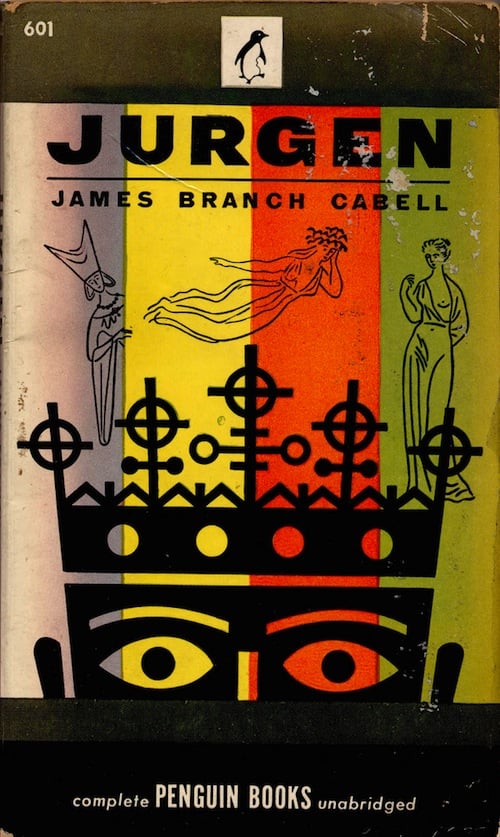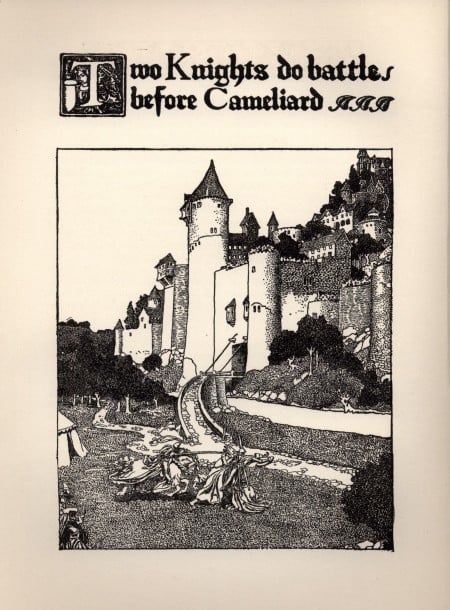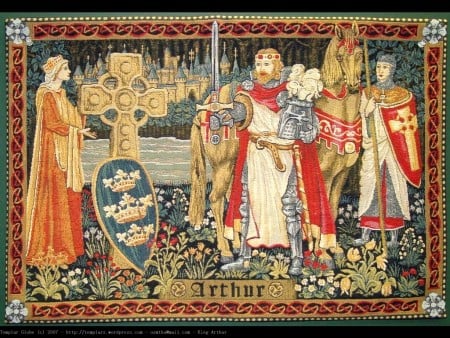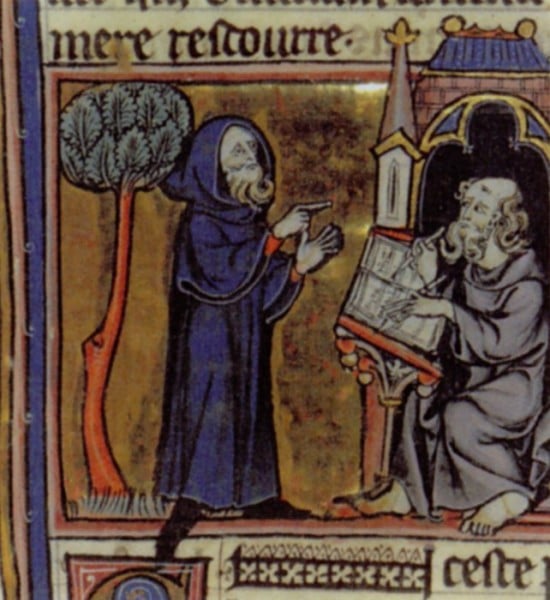Jurgen (12)
By:
June 2, 2015

James Branch Cabell’s 1919 ironic fantasy novel Jurgen, A Comedy of Justice, the protagonist of which seduces women everywhere he travels — including into Arthurian legend and Hell itself — is (according to Aleister Crowley) one of the “epoch-making masterpieces of philosophy.” Cabell’s sardonic inversion of romantic fantasy was postmodernist avant la lettre. HiLoBooks is pleased to serialize Jurgen here at HILOBROW. Enjoy!
So Jurgen brushed from the table the chessmen that were set there in readiness for a game, and he emptied the silver flagons upon the ground. His reasons for not meddling with the horn he explained to the Princess: she shivered, and said that, such being the case, he was certainly very sensible. Then they mounted, and departed from the black and silver pavilion. They came thus without further adventure to Gogyrvan Gawr’s city of Cameliard.
Now there was shouting and the bells all rang when the people knew their Princess was returned to them: the houses were hung with painted cloths and banners, and trumpets sounded, as Guenevere and Jurgen came to the King in his Hall of Judgment. And this Gogyrvan, that was King of Glathion and Lord of Enisgarth and Camwy and Sargyll, came down from his wide throne, and he embraced first Guenevere, then Jurgen.

“And demand of me what you will, Duke of Logreus,” said Gogyrvan, when he had heard the champion’s name, “and it is yours for the asking. For you have restored to me the best loved daughter that ever was the pride of a high king.”
“Sir,” replied Jurgen, reasonably, “a service rendered so gladly should be its own reward. So I am asking that you do in turn restore to me the Princess Guenevere, in honorable marriage, do you understand, because I am a poor lorn widower, I am tolerably certain, but I am quite certain I love your daughter with my whole heart.”
Thus Jurgen, whose periods were confused by emotion.
“I do not see what the condition of your heart has to do with any such unreasonable request. And you have no good sense to be asking this thing of me when here are the servants of Arthur, that is now King of the Britons, come to ask for my daughter as his wife. That you are Duke of Logreus you tell me, and I concede a duke is all very well: but I expect you in return to concede a king takes precedence, with any man whose daughter is marriageable. But to-morrow or the next day it may be, you and I will talk over your reward more privately. Meanwhile it is very queer and very frightened you are looking, to be the champion who conquered Thragnar.”

For Jurgen was staring at the great mirror behind the King’s throne. In this mirror Jurgen saw the back of Gogyrvan’s crowned head, and beyond this, Jurgen saw a queer and frightened looking young fellow, with sleek black hair, and an impudent nose, and wide-open bright brown eyes which were staring hard at Jurgen: and the lad’s very red and very heavy lips were parted, so that you saw what fine strong teeth he had: and he wore a glittering shirt with curious figures on it
“I was thinking,” says Jurgen, and he saw the lad in the mirror was speaking too, “I was thinking that is a remarkable mirror you have there.”
“It is like any other mirror,” replies the King, “in that it shows things as they are. But if you fancy it as your reward, why, take it and welcome.”
“And are you still talking of rewards!” cries Jurgen. “Why, if that mirror shows things as they are, I have come out of my borrowed Wednesday still twenty-one. Oh, but it was the clever fellow I was, to flatter Mother Sereda so cunningly, and to fool her into such generosity! And I wonder that you who are only a king, with bleared eyes under your crown, and with a drooping belly under all your royal robes, should be talking of rewarding a fine young fellow of twenty-one, for there is nothing you have which I need be wanting now.”
“Then you will not be plaguing me any more with your nonsense about my daughter: and that is excellent news.”
“But I have no requirement to be asking your good graces now,” said Jurgen, “nor the good will of any man alive that has a handsome daughter or a handsome wife. For now I have the aid of a lad that was very recently made Duke of Logreus: and with his countenance I can look out for myself, and I can get justice done me everywhere, in all the bedchambers of the world.”
And Jurgen snapped his fingers, and was about to turn away from the King. There was much sunlight in the hall, so that Jurgen in this half-turn confronted his shadow as it lay plain upon the flagstones.
And Jurgen looked at it very intently.
“Of course,” said Jurgen presently, “I only meant in a manner of speaking, sir: and was paraphrasing the splendid if hackneyed passage from Sornatius, with which you are doubtless familiar, in which he goes on to say, so much more beautifully than I could possibly express without quoting him word for word, that all this was spoken jestingly, and without the least intention of offending anybody, oh, anybody whatever, I can assure you, sir.”
“Very well,” said Gogyrvan Gawr: and he smiled, for no reason that was apparent to Jurgen, who was still watching his shadow sidewise. “To-morrow, I repeat, I must talk with you more privately. To-day I am giving a banquet such as was never known in these parts, because my daughter is restored to me, and because my daughter is going to be queen over all the Britons.”
So said Gogyrvan, that was King of Glathion and Lord of Enisgarth and Camwy and Sargyll: and this was done. And everywhere at the banquet Jurgen heard talk of this King Arthur who was to marry Dame Guenevere, and of the prophecy which Merlin Ambrosius had made as to the young monarch. For Merlin had predicted:
“He shall afford succor, and shall tread upon the necks of his enemies: the isles of the ocean shall be subdued by him, and he shall possess the forests of Gaul: the house of Romulus shall fear his rage, and his acts shall be food for the narrators.”

“Why, then,” says Jurgen, to himself, “this monarch reminds me in all things of David of Israel, who was so splendid and famous, and so greedy, in the ancient ages. For to these forests and islands and necks and other possessions, this Arthur Pendragon must be adding my one ewe lamb; and I lack a Nathan to convert him to repentance. Now, but this, to be sure, is a very unfair thing.”
Then Jurgen looked again into a mirror: and presently the eyes of the lad he found therein began to twinkle.
“Have at you, David!” said Jurgen, valorously; “since after all, I see no reason to despair.”
Footnotes from Notes on Jurgen (1928), by James P. Cover — with additional comments from the creators of this website; rewritten, in some instances, by HiLoBooks.
* Cameliard — Cameliard was the land ruled over by Leodegrance, Guenevere’s father in the English legends of Arthur.
* Enisgarth — Perhaps this is the same as Inisguerth, an ancient name for the Isle of Wight.
* Camwy — ? (The Welsh word ” camwy” means bending or winding.)
* Sargyll — ? (There is a region in western Scotland named Argyll.)
* Arthur — This is the legendary hero of early Britain, who is best known to English readers through Malory’s Morte d’Arthur and Tennyson’s Idylls of the King.
* Sornatius — Sornatius is cited by the elder Pliny, but his works have perished.
* Merlin Ambrosius — Satan, angered at Christ’s victory over him, begot a son unlawfully upon a virgin. This son was to possess the wisdom of Socrates, but to teach anti-Christian doctrine. Blaise baptized the infant and saved it from Satan’s power. The child was Merlin, the powerful magician of Arthurian romance. At the height of his powers he fell in love with the child Nimuë and rashly taught her certain of his charms; so that, while he was sleeping, she wove about him one of the magic spells he had taught her and imprisoned him forever in an invisible tower.
RADIUM AGE SCIENCE FICTION: “Radium Age” is HILOBROW’s name for the 1904–33 era, which saw the discovery of radioactivity, the revelation that matter itself is constantly in movement — a fitting metaphor for the first decades of the 20th century, during which old scientific, religious, political, and social certainties were shattered. This era also saw the publication of genre-shattering writing by Edgar Rice Burroughs, Sax Rohmer, E.E. “Doc” Smith, Jack London, Arthur Conan Doyle, Aldous Huxley, Olaf Stapledon, Karel Čapek, H.P. Lovecraft, Charlotte Perkins Gilman, Yevgeny Zamyatin, Philip Gordon Wylie, and other pioneers of post-Verne/Wells, pre-Golden Age “science fiction.” More info here.
READ GORGEOUS PAPERBACKS: HiLoBooks has reissued the following 10 obscure but amazing Radium Age science fiction novels in beautiful print editions: Jack London’s The Scarlet Plague, Rudyard Kipling’s With the Night Mail (and “As Easy as A.B.C.”), Arthur Conan Doyle’s The Poison Belt, H. Rider Haggard’s When the World Shook, Edward Shanks’ The People of the Ruins, William Hope Hodgson’s The Night Land, J.D. Beresford’s Goslings, E.V. Odle’s The Clockwork Man, Cicely Hamilton’s Theodore Savage, and Muriel Jaeger’s The Man with Six Senses. For more information, visit the HiLoBooks homepage.
SERIALIZED BY HILOBOOKS: Jack London’s The Scarlet Plague | Rudyard Kipling’s With the Night Mail (and “As Easy as A.B.C.”) | Arthur Conan Doyle’s The Poison Belt | H. Rider Haggard’s When the World Shook | Edward Shanks’ The People of the Ruins | William Hope Hodgson’s The Night Land | J.D. Beresford’s Goslings | E.V. Odle’s The Clockwork Man | Cicely Hamilton’s Theodore Savage | Muriel Jaeger’s The Man With Six Senses | Jack London’s “The Red One” | Philip Francis Nowlan’s Armageddon 2419 A.D. | Homer Eon Flint’s The Devolutionist | W.E.B. DuBois’s “The Comet” | Edgar Rice Burroughs’s The Moon Men | Charlotte Perkins Gilman’s Herland | Sax Rohmer’s “The Zayat Kiss” | Eimar O’Duffy’s King Goshawk and the Birds | Frances Hodgson Burnett’s The Lost Prince | Morley Roberts’s The Fugitives | Helen MacInnes’s The Unconquerable | Geoffrey Household’s Watcher in the Shadows | William Haggard’s The High Wire | Hammond Innes’s Air Bridge | James Branch Cabell’s Jurgen | John Buchan’s “No Man’s Land” | John Russell’s “The Fourth Man” | E.M. Forster’s “The Machine Stops” | John Buchan’s Huntingtower | Arthur Conan Doyle’s When the World Screamed | Victor Bridges’ A Rogue By Compulsion | Jack London’s The Iron Heel | H. De Vere Stacpoole’s The Man Who Lost Himself | P.G. Wodehouse’s Leave It to Psmith | Richard Connell’s “The Most Dangerous Game” | Houdini and Lovecraft’s “Imprisoned with the Pharaohs” | Arthur Conan Doyle’s “The Sussex Vampire.”
ORIGINAL FICTION: HILOBROW has serialized three novels: James Parker’s The Ballad of Cocky The Fox (“a proof-of-concept that serialization can work on the Internet” — The Atlantic); Karinne Keithley Syers’s Linda Linda Linda (which includes original music); and Robert Waldron’s roman à clef The School on the Fens. We also publish original stories and comics. These include: Matthew Battles’s stories “Gita Nova“, “Makes the Man,” “Imago,” “Camera Lucida,” “A Simple Message”, “Children of the Volcano”, “The Gnomon”, “Billable Memories”, “For Provisional Description of Superficial Features”, “The Dogs in the Trees”, “The Sovereignties of Invention”, and “Survivor: The Island of Dr. Moreau”; several of these later appeared in the collection The Sovereignties of Invention | Peggy Nelson’s “Mood Indigo“, “Top Kill Fail“, and “Mercerism” | Annalee Newitz’s “The Great Oxygen Race” | Flourish Klink’s Star Trek fanfic “Conference Comms” | Charlie Mitchell’s “A Fantasy Land” | Charlie Mitchell’s “Sentinels” | Joshua Glenn’s “The Lawless One”, and the mashup story “Zarathustra vs. Swamp Thing” | Adam McGovern and Paolo Leandri’s Idoru Jones comics | John Holbo’s “Sugarplum Squeampunk” | “Another Corporate Death” (1) and “Another Corporate Death” (2) by Mike Fleisch | Kathryn Kuitenbrouwer and Frank Fiorentino’s graphic novel “The Song of Otto” (excerpt) | John Holbo’s graphic novel On Beyond Zarathustra (excerpt) | “Manoj” and “Josh” by Vijay Balakrishnan | “Verge” by Chris Rossi, and his audio novel Low Priority Hero | EPIC WINS: THE ILIAD (1.408-415) by Flourish Klink | EPIC WINS: THE KALEVALA (3.1-278) by James Parker | EPIC WINS: THE ARGONAUTICA (2.815-834) by Joshua Glenn | EPIC WINS: THE MYTH OF THE ELK by Matthew Battles | TROUBLED SUPERHUMAN CONTEST: Charles Pappas, “The Law” | CATASTROPHE CONTEST: Timothy Raymond, “Hem and the Flood” | TELEPATHY CONTEST: Rachel Ellis Adams, “Fatima, Can You Hear Me?” | OIL SPILL CONTEST: A.E. Smith, “Sound Thinking | LITTLE NEMO CAPTION CONTEST: Joe Lyons, “Necronomicon” | SPOOKY-KOOKY CONTEST: Tucker Cummings, “Well Marbled” | INVENT-A-HERO CONTEST: TG Gibbon, “The Firefly” | FANFICTION CONTEST: Lyette Mercier’s “Sex and the Single Superhero”
